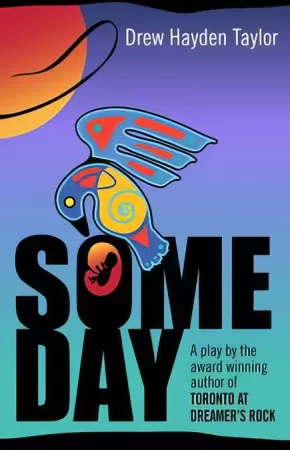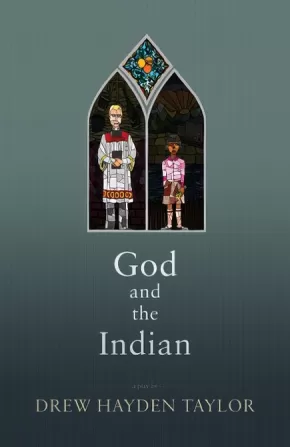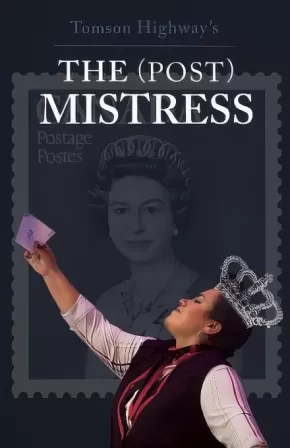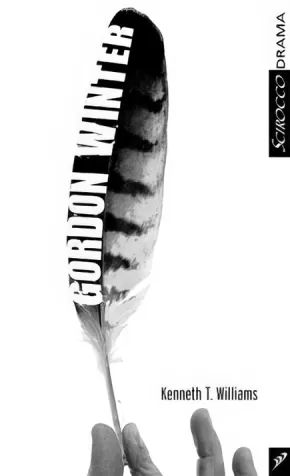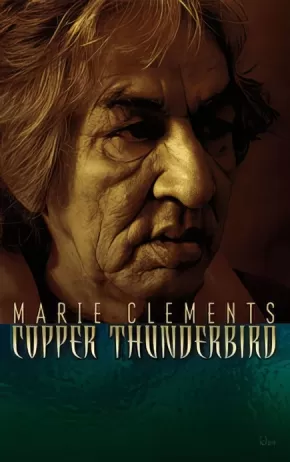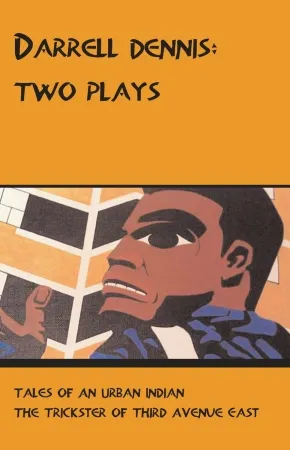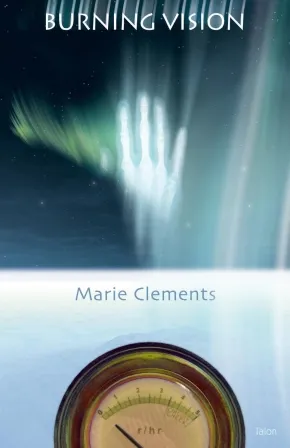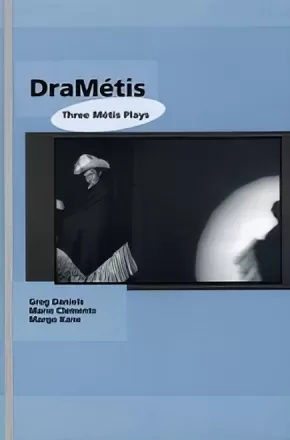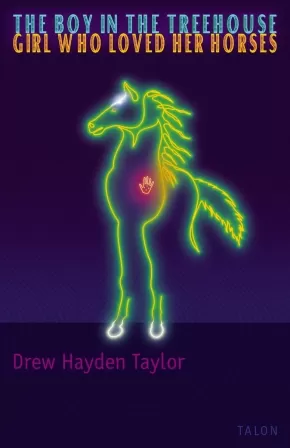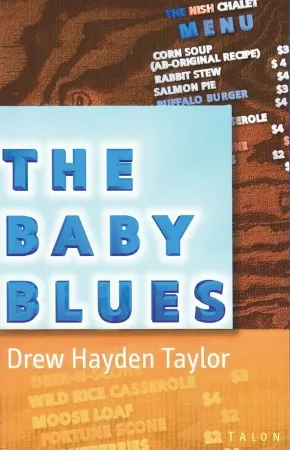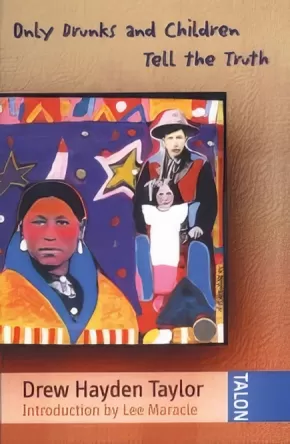Theatre
Synopsis:
Someday is a powerful play by award-winning playwright Drew Hayden Taylor. The story in Someday, though told through fictional characters and full of Taylor's distinctive wit and humour, is based on the real-life tragedies suffered by many Native Canadian families.
Anne Wabung's daughter was taken away by children's aid workers when the girl was only a toddler. It is Christmastime 35 years later, and Anne's yearning to see her now-grown daughter is stronger than ever.
When the family is finally reunited, however, the dreams of neither women are fulfilled.
The setting for the play is a fictional Ojibway community, but could be any reserve in Canada, where thousands of Native children were removed from their families in what is known among Native people as the "scoop-up" of the 1950s and 1960s. Someday is an entertaining, humourous, and spirited play that packs an intense emotional wallop.
Additional Information
142 pages | 5.50" x 8.50" | Paperback
Synopsis:
While panhandling outside a coffee shop, Johnny, a Cree woman who lives on the streets, is shocked to recognize a face from her childhood, which was spent in a residential school. Desperate to hear the man acknowledge the terrible abuse he inflicted on her and other children at the school, Johnny follows Anglican bishop George King to his office to confront him.
Inside King’s office, Johnny’s memories are fluid, shifting, and her voice cracks with raw emotion. Is the bishop actually guilty of what she claims, or has her ability to recollect been altered by poverty, abuse, and starvation experienced on the streets? Can her memories be trusted? Who is responsible for what?
At its core, God and the Indian, by celebrated Aboriginal playwright Drew Hayden Taylor, explores the complex process of healing through dialogue. Loosely based on Death and the Maiden by Chilean playwright Ariel Dorfman, the play identifies the ambiguities that frame past traumatic events. Against the backdrop of Canada’s Truth and Reconciliation Commission, which has facilitated the recent outpouring of stories from residential school survivors across the country, the play explores what is possible when the abused meets the abuser and is given a free forum for expression.
Synopsis:
Growing up on the Six Nations native reserve, Salt Baby never quite fit in, as a “white” looking “Indian” — fair skin and curly hair made her more of a Shirley Temple type than a Pocahontas type. Salt Baby navigates the native reserve and the city while explaining herself, as well as her blood quantrum, to the world and to “Alligator”: “It’s always different for Indians.”
Reviews
“This hilarious and moving play explores the experience of being invisibly ethnic and raises questions about how we expect Aboriginal people to look.” —Toronto Arts Online
Additional Information
74 pages | 5.40" x 8.40"
Synopsis:
Canada’s most famous Aboriginal playwright, Tomson Highway, sets his latest theatrical achievement, The (Post) Mistress, in a not-so-distant past, when sending letters through the mail was still vital to communicating with friends and loved ones, and the small-town post office was often the only connection to faraway places longed-for or imagined.
Born and raised in Lovely, Ontario, a small French-Canadian farming village near Lake Huron, Marie-Louise Painchaud has never had occasion to venture much farther than the nearest community – Complexity, a copper-mining town and a somewhat larger dot on the map of the Georgia Bay area. For thirty years, Marie-Louise has worked at the local post office, and, through the many letters she sorts when they arrive and the ones that she stamps before they go out, she has come to know the lives of everyone in town and vicariously experience their various loves, losses, and personal dramas.
In this one-woman musical tour de force, Marie-Louise confides in us the interwoven stories sealed in the envelopes she handles every day. A samba beat offers the soundtrack for the tale of a local woman’s passion- ate but doomed affair with a man from Rio de Janeiro; a rhythmic tango plays as Marie-Louise divulges a friend’s steamy tryst in Argentina. All together, twelve unique musical pieces, ranging from Berlin cabaret to French café chanson to smooth bossa nova, accompany a multilingual French, Cree, and English libretto.
In The (Post) Mistress, Tomson Highway creates not only a rural comedy but also a sublime parody of small-town life – the northern Ontario version of Thornton Wilder’s Our Town or Stephen Leacock’s Sunshine Sketches of a Little Town.
Cast of 1 woman.
Synopsis:
In a post-apocalyptic world, Bern and Elena are exiled from their village. Their crime? The two women are no longer of child-bearing age.
Forced to rely upon traditional wisdom for their survival, Elena and Bern retreat from the remains of civilization to a freezing, desolate landscape where they attempt to continue their lives after the end of the world. When a charismatic stranger from the village arrives seeking their aid, the women must decide whether they will use their knowledge of the past to give the society that rejected them the chance at a future.
Additional Information
80 pages | 5.36" x 8.39"
Synopsis:
Gordon Winter is an RCMP hero, a life-long champion of First Nations rights, and a bigot. He's challenging the next generation of chiefs to stand up to the federal government when he spews a Nazi-inspired racist and homophobic rant. Suddenly, one of the most revered First Nations leaders is now one of the most reviled human beings in Canada. While most want to consign Winter to the dustbin of history, some are quick to defend a man who did so much good in his life. Questions get asked: how should society respond to such outrageous comments from a prominent and public figure? Is it right to condemn a man based on just one moment of his life? Where did these convictions come from?
The play moves forward in following Winter as he fights the criminal charge of inciting hate. It also moves backwards to show why Queen Elizabeth II pinned a medal of bravery onto his chest in the 70s, and to a critical moment in his childhood when the seeds of hate were planted by a small act of kindness.
Synopsis:
Irreverently funny and brutally honest Governor General's Award-winning play about loss and redemption. Cast of 2 women and 4 men.
Grades 10-12 English First Peoples resource for the units Childhood through the Eyes of Indigenous Writers and Further Steps toward Reconciliation.
96 pages | 5.50" x 8.50"
Synopsis:
Copper Thunderbird is a play on canvases based on the life of Norval Morrisseau. Inside the power-lines which Morrisseau boldly defined in his art were the colours he experienced between his Ojibwa cosmology, his life on the street, and his spiritual and philosophical transformations to become the Father of Contemporary Native Art and a Grand Shaman. Appearing simultaneously in this multi-layered drama as a small boy, a young warrior and an old man, Morrisseau confronts his many selves over the Faustian destiny he encountered during his vision quest—a momentary terror that led to a life wracked by both triumph and ordeal, drawing his vibrant colours, both luminous and dark, from the life-force within him.
Norval Morrisseau is notorious for the life he has led, the company he has kept, the wives, lovers, parasitic drinking buddies and abusive family members he has had and passed through as if they were merely insubstantial phantoms. The paintings he has sold to buy another bottle of alcohol, to get through another brutal day, hang in galleries around the world, a phenomenon Morrisseau himself simply took for granted. Framed variously with the identities of Indian, Artist and Shaman, Copper Thunderbird interrogates both the stereotypes and the politically correct judgments that have manufactured Morrisseau’s public personae, creating a power-figure that transcends culture and morality, earth and water, fire and air.
Additional Information
84 pages | 6.00" x 9.00"
Synopsis:
Tales of an Urban Indian is a one-person play that follows the trials and tribulations of Simon Douglas, a young First Nations man who moves from his rural reservation to the big city of Vancouver. This dark comedy examines the issues of race, identity, and assimilation that drive young Indigenous men to self-destruction.
In The Trickster of Third Avenue East, Roger and Mary are spiralling out of control but are too scared to let each other go. Enter J.C., a mysterious visitor who turns their lives upside down and forces them to confront their darkest secrets. J.C. pushes Roger and Mary into the realm of the supernatural and past the brink of sanity.
Additional Information
134 pages | 5.45" x 8.40" | Paperback
Synopsis:
Marie Clements’s play sears a dramatic swath through the reactionary identity politics of race, gender and class, using the penetrating yellow-white light, the false sun of uranium and radium, derived from a coal black rock known as pitchblende, as a metaphor for the invisible, malignant evils everywhere poisoning our relationship to the earth and to each other.
Burning Vision unmasks both the great lies of the imperialist power-elite (telling the miners they are digging for a substance to “cure cancer” while secretly using it to build the atomic bombs that devastated Hiroshima and Nagasaki); and the seemingly small rationalizations and accommodations people of all cultures construct to make their personal circumstances yield the greatest benefit to themselves for the least amount of effort or change on their part. It is also a scathing attack on the “public apology” as yet another mask, as a manipulative device, which always seeks to conceal the maintenance and furtherance of the self-interest of its wearer.
Clements’s powerful visual sets and soundscapes contain curtains of flames which at times assume the bodies of a chorus passing its remote judgment, devoid of both pity and fear, on the action: a merciless indictment of the cross-cultural, buried worm of avarice and self-interest hidden within the terrorism of the push to “go with the times,” to accept the iconography of a reality defined, contextualized and illuminated by others.
Marie Clements writes, or, perhaps more accurately, composes, with an urbane, incisive and sophisticated intellect deeply rooted in the particulars of her place, time and history.
Cast of five women and 12 men.
Reviews
“Clements covers a lot of ground, but she knows her territory and travels it deftly… Clements dips her pen in numerous cross-cultural references, from cherry trees to caribou to Hank Williams, and writes with a magical irreverence that highlights this tragic saga. Her rich poetic style evokes parallels between Japanese and native myths – not unlike Yeats’ Noh Plays where Celtic and Japanese myths meld – finding connection through ancient truths and the power of the soil, except in this case the soil is literally explosive.”– Quill & Quire
"I remember reading this play in my undergrad and being shocked and impressed at how much theatre could do and be. This was a far cry from the kitchen sink dramas I had already (naively) decided formed the bulk of contemporary Canadian theatre. Far from the confines of the kitchen, Burning Vision travels across the globe and through time, offering a complex portrait of interconnectedness, shared trauma, and shared responsibility for healing. Fifteen years after it premiered in Vancouver and the subject matter is still, sadly, “of the moment” as we wrestle with climate change and isolationist politics. Requiring a diverse cast to fill parts such as the Dene Seer and Tokyo Rose, and requiring a flexible space so it can be staged in the round, there is no doubt that this play can be challenging. But it is challenging in the best sense of the term, in that it is full of possibilities and invites creative minds in to tackle the important challenges of our day. - Lisa, from PledgeProject
Additional Information
128 pages | 5.50" x 8.50" | Paperback
Synopsis:
The Buz’Gem Blues is the third play in Drew Hayden Taylor’s ongoing zany, outrageous, often farcical examination of both Native and non-Native stereotypes in what is to become what he calls his “Blues Quartet.”
Marianne has talked her mother, Martha, into attending an Elders conference with her, where she is to be used as a resource person, even though Martha doesn’t believe she has anything to offer anyone. Held in a college setting, the keynote paper of the conference is a dissertation on “the courting, love, and sexual habits of contemporary First Nations people as perceived by Western Society,” delivered by none other than a “Professor Savage.” Just to keep the caricatures in balance, Savage’s nemesis throughout the action is a young Native man, replete with dark sunglasses and a Mountie coat, who goes by the name “The Warrior Who Never Sleeps.”
The Buz’Gem Blues is not a play about clichés with which we have become so familiar that we recognize them as stereotypes instantly, but rather about how our ritualized and institutionalized systems of maintaining and policing those clichés prevent us from recognizing our common humanity within each other.
Additional Information
128 pages | 5.50" x 8.50" | Paperback
Synopsis:
DraMétis is the first anthology to focus on the emerging discipline of Métis drama. The pieces have all been previously produced and highlight the diversity of Métis drama being written and performed in Canada.
Synopsis:
In this collection of two plays about the process of children becoming adults, Drew Hayden Taylor works his delightfully comic and bitter-sweet magic on the denials, misunderstandings and preconceptions which persist between Native and Colonial culture in North America.
In “The Boy in the Treehouse,” Simon, the son of an Ojibway mother and a British father, climbs into his half-finished tree house on the vision-quest his books say is necessary forhim to reclaim his mother’s culture. “It’s a Native thing,” he informs his incredulous father (who tells him he’d never heard of such a thing from his wife): “Only boys do it. It’s part of becoming a man.” Of course, what with the threats of the police, the temptation of the barbeque next door, and the distractions of a persistent neighbourhood girl, Simon probably wouldn’t recognize a vision if he fell overit.
“Girl Who Loved Her Horses” is the Native name for the strange and quiet Danielle from the non-status community across the tracks, imbued with the mysterious power to draw the horse “every human being on the planet wanted but could never have.” She is and remains an enigma to the people of the reservation, but the power of her spirit remains strong. Years later, a huge image of her horse reappears, covering an entire side of a building in a blighted urban landscape of beggars and broken dreams. The eyes of her stallion, which once gleamed exhilaration and freedom, now glare with defiance and anger. Danielle has clearly been forced to grow up.
With these two plays, Taylor rediscovers an issue long forgotten in our “post-historical” age: the nature of, and the necessity for, these rites of passage in all cultures.
Additional Information
160 pages | 5.50" x 8.50" | Paperback
Synopsis:
The Baby Blues is Drew Hayden Taylor’s highly wrought farce of patrimony in a stifling, politically correct, post-colonial milieu of “fancy dancers” of every stripe on the powwow trail. In juxtaposing three generations of careless wandering hedonists, progenitors of a string of offspring from their six-night stands, with their erstwhile naïve women partners who are always left holding the bag, the “big questions” of heritage, family, cultural context and personal identity are ruthlessly stripped of their conventional meanings and become so much useless, embarrassing roadkill on the highway of life.
Cast of 3 women and 3 men.
Additional Information
96 pages | 5.50" x 8.50" | Paperback
Synopsis:
Only Drunks and Children Tell the Truth is the emotional story of a woman’s struggle to acknowledge her birth family. Grace, a Native girl adopted by a White family, is asked by her birth sister to return to the Reserve for their mother’s funeral. Afraid of opening old wounds, Grace must find a place where the culture of her past can feed the truth of her present. Cast of 2 women and 2 men.
Reviews
“…this play is a very tender, engaging look at two strangers learning to be sisters…witty one-liners and snappy dialogue has crafted likeable, real characters…brings a satisfying sense of closure to the struggles of Barb and Janice/Grace. It is a welcome ending, one that reflects hope for the future – not only for these two sisters , but also for all the others who have yet to find their way home.” - Cheryl Isaacs, Aboriginal Voices.
Awards
- James Buller Award for Playwright of the Year, 1997
- Dora Mavor Moore Award for Outstanding New Play, Small Theatre Division, 1996.
Educator Information
Grades 11-12 BC English First Peoples resource for the units Yes, there is Funny Stuff - Humour in First Peoples Literature and What Creates Family?
Additional Information
112 pages | 6.00" x 9.00"

